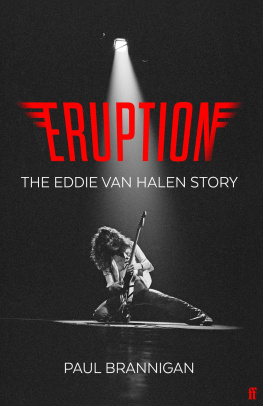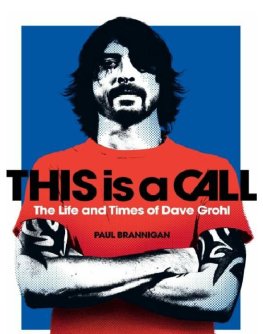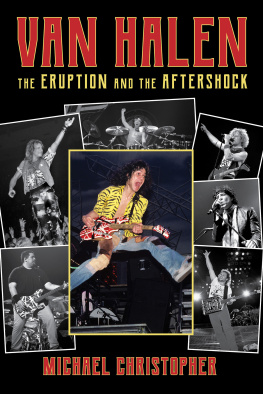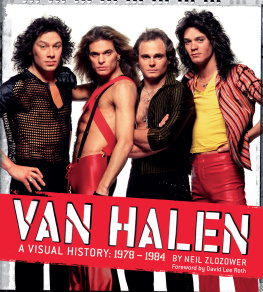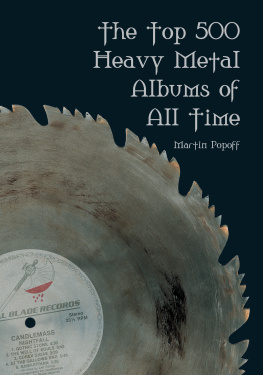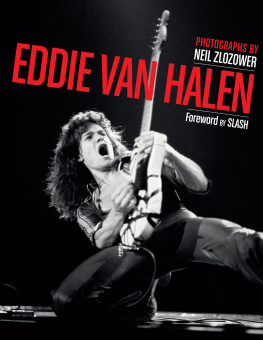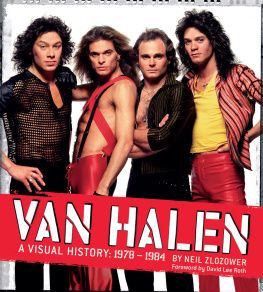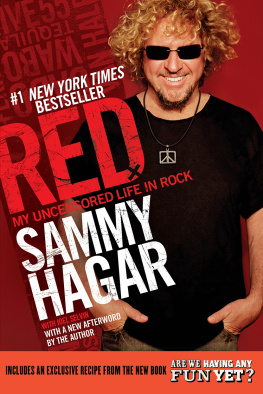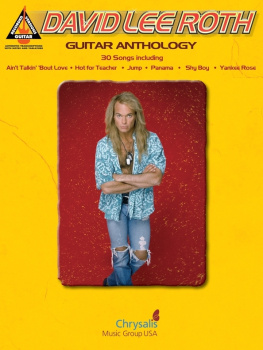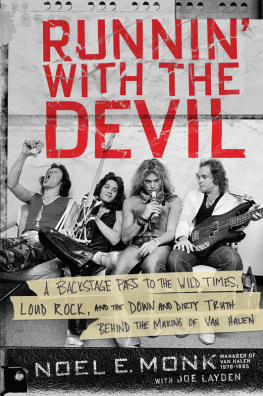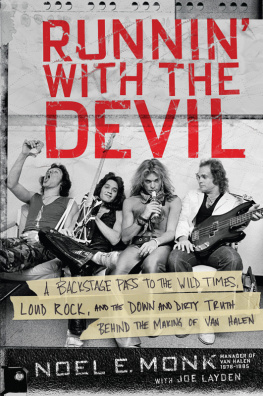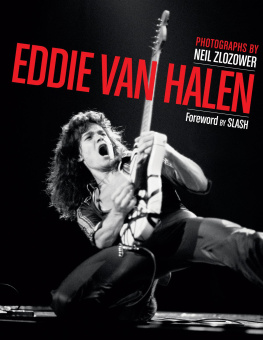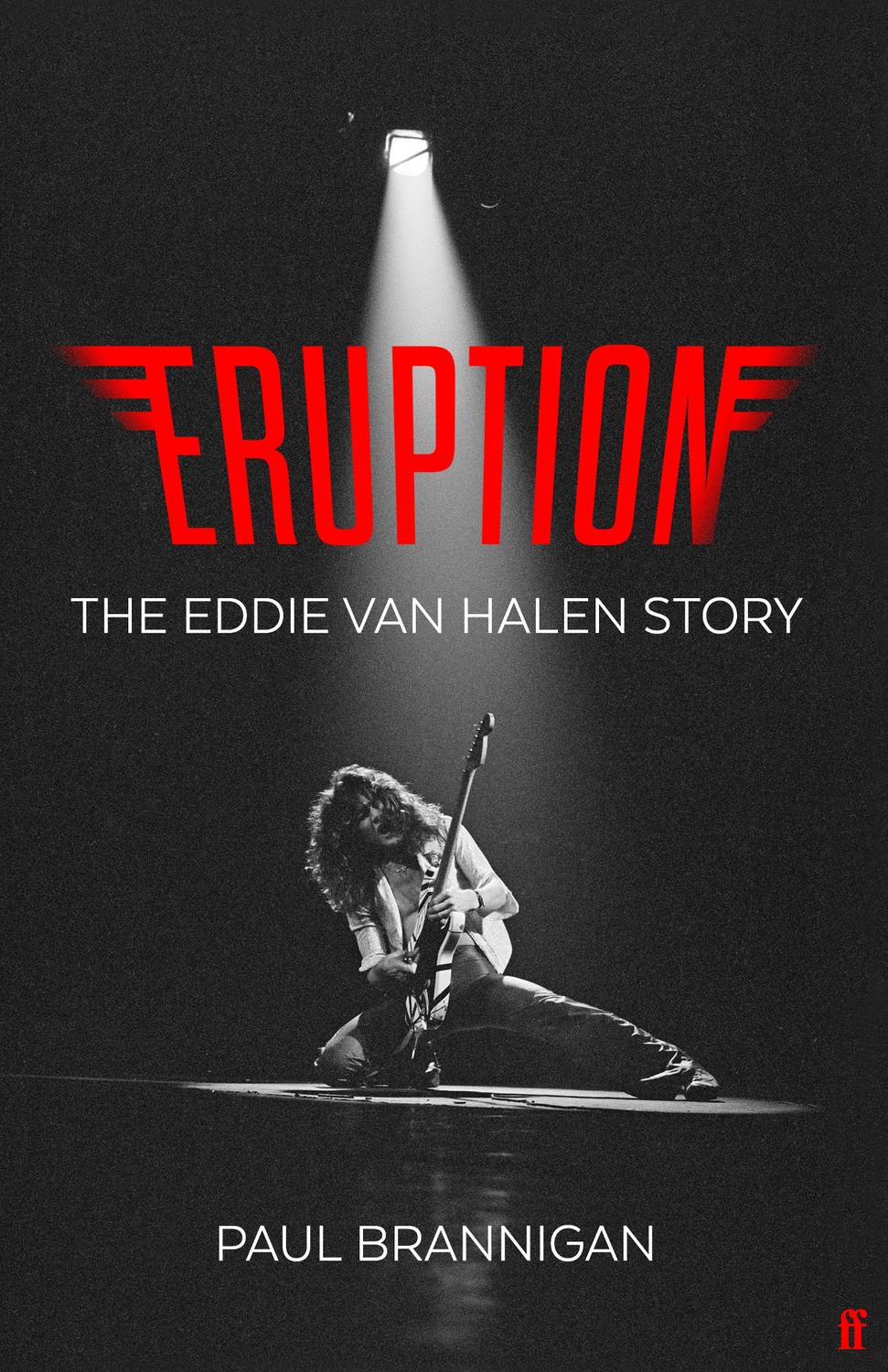Lost in music, Eddie Van Halen didnt initially hear his wife screaming at him as he repeatedly pounded out the keyboard riff which had been living rent-free in his head for the best part of two years. Only later, listening back to his first demo recording of that percussive chord vamp, instantly recognisable now as the introduction to his bands signature anthem Jump, could Eddie pick out the exasperated yells of Shut up! coming from the couples bedroom as he jabbed staccato triads on the synth on his living-room floor.
In the earliest months of his residency in America, constantly hearing those same two words from bullying teachers, from racist classmates, from the stressed, exhausted, homesick parents in the two families who shared the three-bedroom property in the Pasadena suburbs in which his own family was housed upon emigrating to California caused the previously confident, happy-go-lucky, inquisitive Dutch youngster to withdraw deep into his own imagination. It wasnt until he discovered rock n roll, and the liberating potential of an over-amplified electric guitar, that the young Eddie Van Halen found his voice and began to reimagine the world around him. That process began soon after he reached the age of majority, when, dissatisfied with the mass-produced classic guitars that had helped democratise rock n roll for the generation which preceded him, he invented his own hybrid instrument, a bespoke Frankenstrat. He then set about creating a whole new vocabulary for this misshapen mongrel as, alongside his elder brother Alex, he negotiated a life in music with the band that bore his surname. Still viii he was told to shut up: by club owners who wanted their patrons sedated with familiar pop standards; by buzz-kill cops whod gatecrash the chaotic, over-subscribed backyard parties Van Halen played every weekend, barking dispersal orders at hundreds of high-school students flipping the bird skywards at the hovering Pasadena Police Department helicopter; even, with increasing regularity, by the needy, limelight-addicted, man-child singer by his side. But the guitarist would be silent no more.
The release of Van Halens dazzling self-titled debut album in February 1978 shifted the course of rock n roll history. As with debut sets from the Jimi Hendrix Experience, Led Zeppelin, Black Sabbath, Ramones, Public Enemy and N.W.A., it created a fresh, original, revitalising blueprint for music with attitude.
Lets be clear: while it emerged at a time when disco and new wave had captured the popular imagination, Van Halen didnt save hard rock and heavy metal no rock fan in 1978 listening to Powerage or Live and Dangerous or Stained Class or Hemispheres or Tokyo Tapes considered the genre on its knees, and the nascent New Wave of British Heavy Metal movement which would propel Iron Maiden and Def Leppard into US arenas within five years owed precisely nothing to the Pasadena party rockers but Eddies innovative, incandescent guitar-playing undoubtedly lit a new fire under the genre. And with Eruption, his jaw-dropping 102-second solo showcase, blending laser-guided hammer-ons and pull-offs, blur-speed neo-classical triplets, two-handed legato tapping and gravity-drop whammy-bar plunges, the twenty-three-year-old guitarist established a new Year Zero for his fellow players. On hearing it, guitarists inevitably had two questions: How the fuck is he doing that? and How can I copy it? The most iconic instrumental showcase since Jimi Hendrixs Woodstock savaging of The Star-Spangled Banner, Eruption served to bisect hard rocks timeline into Pre-EVH and Post-EVH, creating both a generation of inferior copycat technicians and, arguably of greater significance, a subculture of alternative rock guitarists who, ix awed and daunted by Eddies virtuosity, sought to focus instead on fashioning less technical, more individualistic approaches to playing the instrument. Eddie, of course, had his own influences early Eric Clapton, Alvin Lee, Jimmy Page, Pete Townshend, Jeff Beck and Allan Holdsworth to name but a few but in terms of a mindset and modus operandi underpinning his approach to the guitar, it may be instructive to remove any identification with Englands rock aristocracy and, instead, recentre Eddie spiritually with Californias Z-Boys skateboard crew of the mid-1970s Tony Alva, Jay Adams, Stacy Peralta, Peggy Oki fearless, questing, daredevil athletes who constantly pushed boundaries, both physical and psychological. Like Tony Alva with a wooden deck and polyurethane wheels beneath his feet, Eddie felt at his most weightless with wood and wires in his hands uncontainable, unstoppable, unchained. As with the Z-Boys launching themselves into empty suburban Californian swimming pools, Eddies approach to guitar solos was to leap into the unknown, with no preconceived idea of where, or indeed how, he might land and no fear of the descent. Like a skater, too, he viewed the bumps and dips of the landscape stretching before him as a space for free expression, and where others saw obstacles, he saw opportunities. Edward has a sense of adventure, David Lee Roth once noted approvingly. He will dive headfirst. Well see if theres water in the pool later.
I met Eddie Van Halen only once, at his 5150 studio facility in the grounds of his Los Angeles home, in spring 1998. With its twin-seater SEGA Daytona USA racing game, Twister pinball machine, Asteroids arcade game, widescreen TV and racks of video cassettes and CDs, the studios reception room resembled a teenage boys idea of an adult males home, but the juxtaposition, in the kitchen, of a photograph of Eddie and Alexs childhood home in Nijmegen, Holland, with a huge, gleaming Recording Industry Association of America presentation plaque acknowledging their groups 60 million US record sales was a striking reminder of just how far Jan and Eugenia Van Halens boys had come. x
The man of the house could not have been more gracious or hospitable, proffering non-alcoholic beers before taking a seat on a black couch alongside his bands new vocalist, former Extreme frontman Gary Cherone, ready to talk up Van Halens third act, which was being heralded by the St Patricks Day release of the quartets eleventh studio album, Van Halen III. He spoke about his love for his six-year-old son Wolfie, telling how the pair would take trips together to the beach to collect stones to fashion into plectrums, and shared his regret at the demands of his job taking him away from his actress wife, Valerie Bertinelli. Speaking of his pressing need for a hip replacement operation, he noted, Im just a fucking old jerk like anyone else. But when he picked up one of his signature series guitars and began tapping out the riff to Drop Dead Legs on the fretboard, his well-lined face seemed to shed the wear and tear of the past fifteen years in an instant. Over the course of the next hour, as he shared war stories from his twenty-five years in the rock n roll business, that guitar never left his hands. It sang, it roared, it squealed, it grumbled, it spat, and often it seemed to laugh aloud, with Eddie smiling and laughing too, seemingly scarcely able to believe the sounds he was making. Notoriously wary of journalists No one really understands what Im trying to say, he once complained to Guitar Player magazines Jas Obrecht, the writer who conducted Eddies very first media interview in 1978 and became a trusted confidante he placed his own Dictaphone on the table alongside mine as our interview began. It was only years later, as I read more about his working methods, that I realised that his tape recorder wasnt rolling to ensure that his words would not be misquoted in a publication he would surely never read, but rather to capture the riffs and musical motifs which streamed unselfconsciously from his fingers as he spoke, lest there might be gold buried in the deep.

